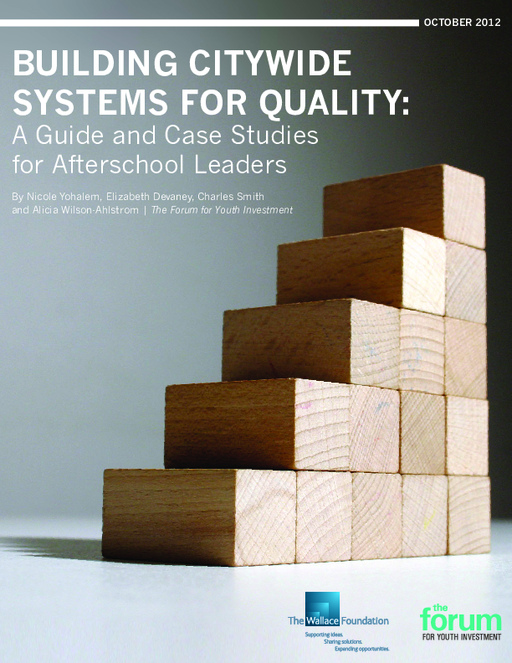- Author(s)
- Nicole Yohalem, Elizabeth Devaney, Charles Smith, and Alicia Wilson-Ahlstrom
- Publisher(s)
- Forum for Youth Investment
Research Approach
This guide was developed by the Forum for Youth Investment (the Forum), a national nonprofit organization dedicated to helping communities and the nation make sure all young people are Ready by 21® – ready for college, work and life. The writing team included senior staff from the Forum and from the David P. Weikart Center for Youth Program Quality, a division of the Forum that focuses on quality improvement, and a consultant who led QIS development for the Providence After School Alliance.
The guide is based on decades of social science research related to child development, teaching and learning, and organizational management, as well as the Forum’s experience working with over 70 afterschool QIS efforts around the country. The guide also draws heavily on efforts in six communities to build quality improvement systems: Atlanta, Ga.; Austin, Texas; Chicago, Ill.; New York, N.Y.; Palm Beach County, Fla. and Hampden County, Mass. The QIS efforts in these communities are all based on a continuous improvement approach but vary in terms of scale and tools. Within each stage of QIS-building described in the guide, artifacts and examples from these communities illustrate best practices. The second half of the guide features individual case studies of each community’s QIS. The case studies were conducted to inform and illustrate the stages and steps involved in building a quality improvement system (QIS). They were developed through in-depth leader interviews, document review, and a formal vetting process involving multiple stakeholders in each community. The cases were selected to represent a variety of approaches to building a QIS.
In developing the guide, the authors took an inductive approach that is sometimes referred to as grounded theory method. They drew upon a large body of research and experience to create a theoretical framework describing the components and stages of QIS building. They then conducted case studies of quality improvement systems in the six communities mentioned above, and used these cases to make adjustments to the framework. Experts in each case study community provided feedback that proved critical in adjusting the framework.

